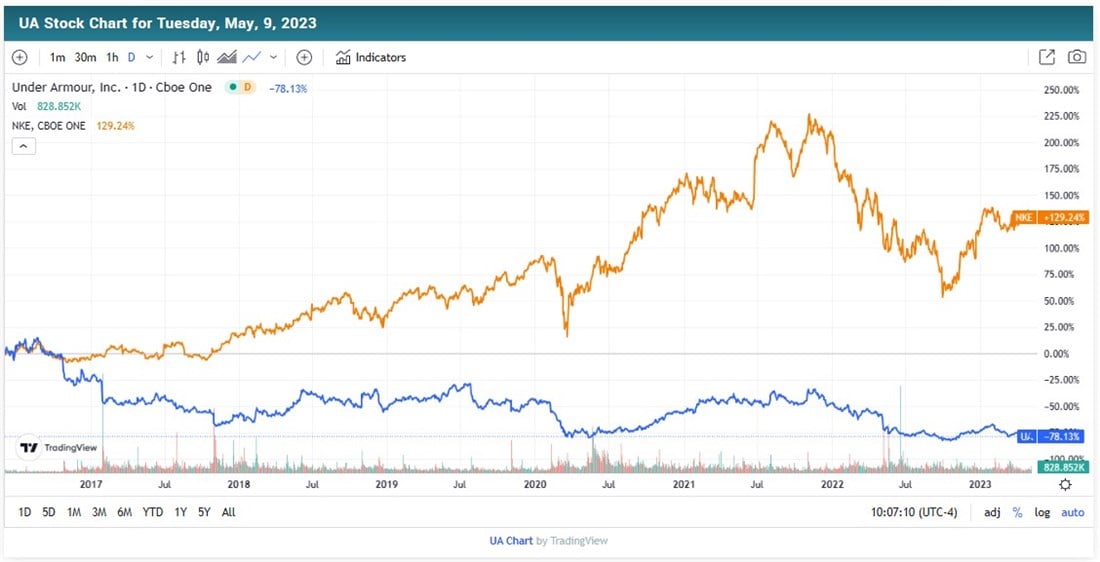Under Armour May Have Just Bottomed Under Armour shares are at a decade-long low valuation, new CEO plans to turn the brand's presence around may be the fuel investors needed to see former glory
This story originally appeared on MarketBeat

Under Armour (NYSE: UA) shares are declining by 8.6% in Tuesday's trading session; the negative sentiment comes amid the company's first quarter 2023 earnings results. Despite new CEO Stephanie Linnartz achieving expense reductions across the SG&A (Selling, General, and Administrative) items, shareholders seem upset concerning the fiscal year 2023 outlooks.
Linnartz is looking to rebuild the brand throughout the year, expanding on product selection and quality and keeping shareholders in focus to deliver more adequate returns. Under Armour's financials will show that the company is recovering, as shown in profit metrics such as ROIC (return on invested capital) exceeding 16%. Subsequently, investors may be in for an opportunity to acquire this brand for the cheapest valuation it has been under in over a decade.
Investor Sentiment
Investors were hopeful amid the new CEO's initiative to bring back growth into the brand and not having the patience to wait out the effects of implementing this pivot. Two thousand twenty-three guidance points to flattish revenue growth and increased capital expenditures to $250 and $270 million. The lack of expected revenue growth may have laid the sell-offs foundation today. However, the heartache may lie within these expected capital expenditure sums. Expanding these ranges could lead to diluted earnings per share between $0.47 and $0.51 for the year, translating to a near 65% decline from the last-twelve-months measured earnings per share.
The earnings per share decline could bring on analyst downgrades and further amplify bearish sentiment toward the stock. Under Armour analyst ratings suggest little upside from these prices, pointing to approximately 7% potential from here, coupled with a 'Hold' rating. In addition, some investors and analysts may point their bearish claws at the company's inventory issues. While the retail industry suffered from inventory bottlenecks amid supply chain disruptions during COVID-19, Under Armour faced a more than $400 million inventory buildup over the twelve months measured.
Typically, such an aggressive inventory buildup would signify significant demand expectations; however, considering current discounts and inventory mark-downs in the industry, this buildup could adversely affect the company's cash flows.
These inventory dynamics, especially promotional mark-downs and product mixes, attributed to a gross margin decline of 310 basis points to finish the quarter at 43.4%. However, with 2023 full-year gross margin expectations set to increase by 25-75 basis points, there may be hope that the CEO's online sales initiative will bring optimized inventory management and sales funnels.
Shareholders in Mind
Even though Stephanie Linnartz has no retail experience, she successfully led the digital transformation at Marriot International (NASDAQ: MAR), where the company kicked off its now-famous rewards program 'Bonvoy'. Now that the apparel industry is moving toward digital sales as a whole, perhaps Linnartz's lack of retail experience will be shadowed by her track record in leading digital sales revolutions before. Expanding Under Armour's brand to young athletes and other off-the-field products will be key in turning the ship around.
Once on the heels of giants like Nike (NYSE: NKE), Under Armour is now falling far behind. Both sales growth and membership loyalty programs have fallen far behind the glory days, and the stock price shows. Nike Stock beat Under Armour stock in a five-year plus performance by 207%.

Investors believing in the brand's future will be pleased to know that the stock is trading at a decade-low price-to-book value multiple of 2.0x. Historically, the stock has traded between 5.0x and 7.0x its book value, creating significant upside potential from today's prices. Management believes it can turn things around at Under Armour. It backs up this view by repurchasing as many as 16.7 million shares through the twelve months.
Although the share repurchase program approved by the board of directors in February 2022 still has some fuel left, as $425 million out of $500 million have been used, shareholders could still see a further $75 million repurchase effected at these cheap valuations.
Technically speaking, the stock is trading near its all-time low price of $5.74. Current support levels are firm around the $6.75 to $7.75 range, allowing investors to pick the company up for a mere 5.0x price-to-earnings ratio. This is a bargain deal for those investors who believe online sales and programs, along with improving inventory environments, can bring Under Armour to its former glory.









